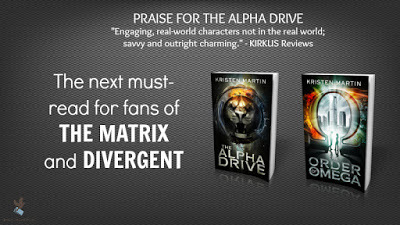How to Craft a Killer Query Letter
Hello All and Happy Tuesday!
I know we’ve talked about self-publishing in some of my previous posts, and I even made a mini-series on YouTube, but what about those of you wanting to go the more traditional route? Just because I’m self-publishing my first series doesn’t mean I never considered going the traditional route. Originally, I actually did query some agents and even sent some sample chapters to a couple which got us talking, but in the end, self-publishing was a better choice for me. Today I want to share my experiences and research on crafting a killer query letter, as well as some do’s & don’ts for querying literary agents.
If you'd rather watch the video on this topic, feel free to click play below. Otherwise, read on!
First, it’s important to understand what a literary agent is and does. A literary agent is someone who attempts to sell your book to a reputable publishing house. They keep up to date with editors’ interests and contact information, and they also negotiate the terms of your contracts with publishers. A literary agent does not guarantee fame and riches, nor do they sell every MS she or he agrees to represent. Nowadays, it’s very difficult (and almost looked down upon) to send your book proposal straight to a publishing house – they expect you to have a literary agent and many won’t work with individual authors. They will work with literary agents only. So it’s good to have an agent in your corner because they will offer guidance or suggestions for improving your book, get it into the hands of editors, and secure an advance or sell your book at an auction. Plus, they know the business and the industry, so their knowledge is invaluable.
So how does one go about snagging a literary agent? By submitting a killer query letter! And today we’re going to talk about how to do that, along with the entire querying process.
First things first, what is a query letter? It’s a one-page letter sent to literary agents in an effort to get them excited about your book. You have one page and 300 words or less to woo a literary agent into falling in love with your story and then requesting your manuscript. Here are some guidelines to consider before writing your query letter:
1. Ensure your MS (manuscript) is 100% complete. Do not start querying with a MS that is only 50% or even 75% complete. Why? If the agent loves your story idea so much and asks for the full manuscript, you’re going to be S-O-L (shit out of luck). Trust me on this one, make sure your MS is completed and has been edited/revised at least twice before starting to query agents.
2. Research potential agentsa. There are many different tools out there to research potential literary agents. I’ve found that AgentQuery is the most user-friendly and up-to-date. And it’s free
3. Check and double check submission guidelinesa. Some agents will request sample chapters be pasted into the body of the query letter email, and others will want them as attachments. Some may not even want sample chapters in the first go around. Every agent is different, so make sure you read the submission guidelines before pressing send!
4. Prepare the necessary submission itemsa. Make sure you have the submission items ready to go before even opening up a new email. Some agents may ask for a full book synopsis, which can take some time to write. Just make sure you have everything ready before drafting the email.
Once you’ve done these things, you can now move onto actually crafting the query letter. Depending on the submission guidelines, the literary agency may only accept emailed submissions. Many agencies have moved to accepting email submissions only because the turn-around time is faster. Just check on this before sending your query letter!
For this video, we are going to focus on query letters for fiction books. There are four basic components of a query letter:
1) Paragraph 1: Opening Lines a. This is your opportunity to hook the literary agent. Share any connection you have with the agent, especially if you met him/her at a conference or if you’re a fan of specific authors that he or she represents. If you have no specific connection with the agent, then immediately get into the action. The job of this first paragraph is to keep the agent reading and for them to get a sense of your book’s genre and marketability. This is not the time to broadcast your sense of humor or to ask broad questions to make the agent ponder. Share the title and genre of your book as well as your book’s word count.b. An example of a weak opening is: Have you ever wondered what it would be like to star in your own reality TV show? What if you were the only one who didn’t know the cameras were rolling? Find out in my book. An example of a strong opening is: Dear Mr. Smith, I’m currently seeking representation for my 70,000-word YA science fiction, THE ALPHA DRIVE. Given your interest in dystopian stories, I thought it might be a good fit for your list. Did I mention I might use parts of my previous query letter as an example?d. Make sure to address the agent you are writing the letter to. If the agent you are querying is named Sandra Clark, write Dear Sandra or Dear Ms. Clark – not Dear Agent. Personalize it!
2) Paragraph 2: The Synopsisa. Succinctly describe the plot of your story. This should be one to two paragraphs that focus on the main plot, setting, and characters. Let the agent know where the story takes place, introduce no more than a couple of characters who are pivotal to the main plot, and vividly describe the arc of the story. Let the agent know what is at stake or on the line for these characters – give them something to get invested in – but don’t give away the entire plot! End on a cliffhanger - you need to leave the agent wanting more!
3) Paragraph 3: Author bioa. Tell the agent a little about yourself. If you have publication credits, writing experience and education, mention it! Any excerpts you’ve published in literary journals or magazines should be mentioned. If nothing relates to the book you’re presenting, list the writing conferences and workshops you’ve attended or general publication credits. If you’re part of a writing organization, like RWA (Romance Writers of America) or SFWA (Science Fiction and Fantasy Writers of America), you should mention it. Keep your author bio relatively short, two sentences at most.
4) Paragraph 4: Appreciation a. We can’t even begin to imagine how inundated these agents’ email boxes are, so don’t forget to thank them for taking the time to review your query. Remember to offer sample chapters and/or the complete manuscript. If you are mailing your query by postal mail, be sure to enclose a self-addressed, stamped envelope, also called a SASE, for the agent’s response.
And what would this post be without an example of a great query letter? I’m sure many of you know Marissa Meyer, author of The Lunar Chronicles. She actually shared the query letter that got her an agent for her debut novel, Cinder, on Novel Novice. It’s actually one of my favorite query letters and I think it’s such a great example, so let’s have a look:
Dear Ms. Grinberg,
I’m seeking representation for Cinder, an 85,000-word futuristic young adult novel and a re-envisioning of the classic Cinderella story. I’m submitting to you because Scott Westerfeld’s Uglies series was hugely inspirational in the writing of this novel, and I hope my futuristic world will capture your interest as well.
(This is paragraph one. She does a great job because she addresses the agent by name, mentions her book title, the genre, and word-count, and connects with the agent by mentioning Scott Westerfeld’s book, which is one that this particular agent represents.)
Sixteen-year-old Cinder is a cyborg, considered a technological mistake by most of society and a burden by her stepmother. Being cyborg does have its benefits, though—Cinder’s brain interface has given her an uncanny ability to fix things (robots, hovers, her own malfunctioning parts), making her the best mechanic in New Beijing. This reputation brings the prince himself to her weekly market booth, needing her to repair a broken android before the annual ball. He jokingly calls it a matter of national security, but Cinder suspects it’s more serious than he’s letting on.
Although eager to impress the prince, Cinder’s intentions are derailed when her younger stepsister, and only human friend, is infected with the fatal plague that’s been devastating Earth for a decade. Blaming Cinder for her daughter’s illness, Cinder’s stepmother volunteers her body for plague research, an “honor” that no one has survived.
But it doesn’t take long for the scientists to discover something unusual about their new guinea pig. The surgeons who turned Cinder into a cyborg had been hiding something. Something valuable.
Something others would kill for.
(This is paragraph 2. Marissa gives a detailed synopsis, where she mentions the setting, only a few of the characters, and she vividly describes the arc of the story, but doesn’t give away the entire plot. She ends on a cliffhanger! Well done.)
I’ve had a novelette, “The Phantom of Linkshire Manor,” published in the gothic romance anthology Bound in Skin (Cats Curious Press, 2007), and am a member of the Romance Writers of America. I hold an MS in Publishing and a BA in Creative Writing, emphasis on children’s literature. My bi-monthly writing newsletter reaches over 450 subscribers.
(This is paragraph 3. Her author bio gives the agent plenty to go off of. I like how she mentions her bimonthly newsletter subscription – this tells the agent that you have a growing fan-base!)
Cinder is the first of a planned series.
I’ve attached the first fifty pages. Thank you for your consideration.
Best regards,
Marissa Meyer
(This is paragraph 4. She lets the agent know that she plans to make this a series (which shows the agent she is serious about writing as a career) and thanks the agent for reviewing her query. The close of the letter is very professional.)
So there you have it! A quick guide to crafting a killer query letter and an awesome example. I hope this helps you craft your own awesome query letter and helps you snag an agent!
Don't forget to check out my books on Amazon:

I'll see you guys in the next post!
Until next time,
 [source]
[source]
Published on August 30, 2016 06:36
No comments have been added yet.



